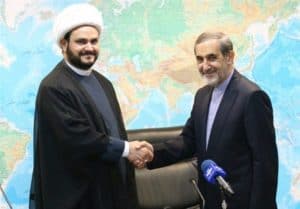
On right, Ali Akbar Velayati, top foreign policy advisor to the supreme leader, receiving Iraqi militia leader Akram al Kabi in Tehran on Sept. 1. Credit: Tasnim News Agency.
Sheikh Akram al Kabi, the leader of the Harakat al Nujaba Iraqi militia, has completed a week-long, high-profile visit to Iran that began in late August. Kabi met with top Iranian government officials and clerics, briefing them about the militia’s activities in both Iraq and Syria. He also gave prime-time television interviews and held multiple press conferences, all in Arabic and translated into Farsi. Militia officials frequently travel to Iran, but the publicity surrounding Kabi’s visit is unprecedented. This indicates the rising clout of the Iraqi cleric among the political elite in Tehran.
Kabi boldly proclaimed his allegiance to Iran’s Supreme Leader, Ali Khamenei, as well as the concept of velayat-e faqih, or guardianship of the jurist, which is the political and theological basis of the Islamic Republic as established by Ayatollah Ruhollah Khomeini. Kabi echoed Tehran’s propaganda claims, and boasted about targeting American forces during the Second Gulf War. He reiterated his commitment to the “Axis of Resistance,” an alliance of state and non-state actors led by Iran. Kabi vowed that the Popular Mobilization Forces (PMF), the umbrella organization of Iraqi paramilitary groups that includes Iranian-backed groups such as Nujaba, would participate in the anticipated operation to lay siege to Mosul, which has been held by the Islamic State since 2014. Following Mosul, Kabi called for Iraqi militias to shift resources to Syria and chase the Islamic State into the strongholds of Deir ez-Zor and Raqqa. He also threatened to target Turkish forces stationed near Mosul.
Kabi thanked Tehran for its full support of Nujaba and other “resistance” groups during his trip. He stressed the necessity of the continued advisory role of Qassem Soleimani, the commander of the Islamic Revolutionary Guard Corps (IRGC) elite external operations unit, the Qods Force. Kabi defended the Iranian commander’s presence in Iraq as legal and per the request of the central government, which Iraqi government officials have said earlier this summer. Kabi also credited Iranian commanders with equipping and training Nujaba, including in urban warfare, which is “happening in Syria.”
As Kabi openly flaunts his ties to Tehran, Baghdad has recognized the PMF as a parallel military institution this past year, making the IRGC-backed network that dominates the PMF and includes designated terrorists like Kabi into legitimate actors in the Iraqi state (See previous analysis by The Long War Journal here). A U.S. military official told Fox News last month that the Iranian-backed Shiite militias number at least 80,000 and up to 100,000.
Although there are Iraqi Shiites and the Holy Precinct of Najaf that oppose velayat-e faqih, the IRGC-backed network in Iraq is poised to become an imposing power bloc post the Islamic State. This network is linked to the global jihadist network led by Tehran, which means they have access to Iranian resources. These actors will work patiently to consolidate and expand their influence in Iraq, which translates to the expansion of Tehran’s influence.
Akram Kabi and Harakat al Nujaba
Kabi has served as a senior commander in the disbanded Mahdi Army and the Asaib Ahl al Haq (AAH), or League of the Righteous. The cleric was listed by the US as a terrorist in September 2008 for aiding the Iraqi insurgency. He was listed along with Abdul Reza Shahlai, a deputy commander in the Qods Force. The Qods Force was instrumental in establishing Harakat al Nujaba, or Movement of the Noble, in 2013 out of AAH to deploy to Syria as part of a larger Iraqi Shiite militia contingency fighting on behalf of Bashar al Assad. Most of these units returned home in 2014 following the incursion of the Islamic State.
In the past year, Nujaba has expanded its activities in Syria, becoming the largest contingent of Iranian-backed Iraqi militias in Syria, thus sustaining military operations in two theaters. Nujaba has deployed to Aleppo its Ammar Yasser Brigade, which has 3,000 fighters, Kabi stated in an interview to Iran’s Press TV on Aug. 31.
Nujaba has impacted the Syrian theater, particularly in Aleppo. Last month, Iranian media announced the deployment of 2,000 Nujaba and Lebanese Hezbollah forces to Aleppo to repel opposition forces attempting to break the siege of the city. After successfully repelling the opposition last week, Nujaba announced the redeployment of an additional 1,000 from other positions in Syria to bolster positions in Aleppo. Qassem Soleimani was sighted on September 6 inspecting Nujaba positions in the southern Aleppo countryside preparing to expand their offensive.
Nujaba’s two other brigades fight in Iraq as the 12th and 30th brigades of the PMF, each numbering 3,000. According to Kabi, Nujaba commands a total of 10,000 men and claim that they have a reserve of “thousands more volunteers” for emergency situations. Kabi claims Iraqi Sunnis are members of the 30th Brigade, and that they have fought in Fallujah and Samarra. He also sought to stress that Nujaba protects Sunnis, Yezidis, and Christians.
Ideological commitment
The IRGC seeks to identify and nurture zealous, competent militiamen who are committed to the Islamic Republic’s ideology and will follow Tehran’s command and control. For the Islamic Republic and its proxies, establishing an Islamic power block as envisioned by Khomeini transcends national identity.
“I say clearly that the Nujaba Islamic resistance is the party of the velayat-e faqih,” Kabi declared in a meeting with Khamenei’s top foreign policy advisor, Ali Akbar Velayati, on Sept. 1. Two days earlier, the Iraqi cleric said that Nujaba is “the followers of the line of the velayat-e faqih with the leadership of Grand Ayatollah Khamenei, and will be present wherever the ‘Axis of Resistance’ needs it.” The militia leader called Khamenei “a divine blessing” for Iraq. Kabi repeated this line several times during his latest trip.
His devotion to Iran and its Supreme Leader has manifested itself in public in the past. Last year, he declared that he would overthrow Iraq’s government if ordered by Khamenei.
Kabi’s reference to Khamenei as Grand Ayatollah further underscores his loyalty. Khamenei is not recognized by the Shiite clergy in Qom or Najaf as a Grand Ayatollah, and his formal Ayatollah status stands on shaky grounds, at best. Khamenei was a mid-ranking cleric and barely 50 years old in 1989 when he was selected among top regime insiders to become Supreme Leader. Officials amended the constitution to allow for Khamenei’s ascendance, as the leader was supposed to be a leading jurist who is recognized at least as an Ayatollah by senior clergy.
“We believe that Iran is the leader of the Islamic world and the velayat-e faqih is the symbol of Islam’s strength,” Kabi said during a meeting with the chairman of the National Security and Foreign Policy Parliamentary Commission, Alaeddin Boroujerdi, on Aug. 29. “It is has come in the accounts from the Innocent Imams [12 Imams] that Imam Mahdi will come with an army from Khorasan (province in northeastern Iran),” Kabi said.
“We in Nujaba believe that a political process must exist in Iraq, but we believe in Islamic government,” Kabi told a conference held at a hardline-affiliated university in Tehran on Aug. 31. “We will not participate directly in Iraq’s political process, but will support some political groups in Iraq,” he declared. “As a velayat-centered group, we believe that the government must be Islamic, but in Iraq, a new political system was established by the Americans, and this political system is tribal-oriented,” Kabi said.
The Battle for Mosul, shift to Syria
Kabi emphasized several times during his trip that the PMF would participate in the battle for Mosul. In late July, the Iraqi Prime Minister approved the participation of 15,000 PMF units following discussions with Hadi al Ameri, head of the IRGC-backed Badr Organization. The Iraqi militia leader told Iranian media during a press conference on Aug. 28 that he could not reveal the time of the operation to liberate Mosul would commence, but that the central government would announce it soon.
“We also intend to enter that [city’s] center,” Kabi declared during a meeting with former IRGC chief Mohsen Rezai on Aug. 28. Although the arrangement may hold to keep militias on the outskirts of major Sunni-majority cities while Iraqi Security Forces and the U.S. military act as the tip of the spear, these militias have played important roles in paving the surrounding areas, and have entered urban centers following the Islamic State’s expulsion. In the past, these militias have committed atrocities and abuses against the civilian population.
During the meeting with Rezai, Kabi claimed that the PMF’s participation in the Mosul operation would foil a U.S. plan to build permanent military bases there. He claimed that the U.S. opposes PMF participation in Mosul because it intends to build such a base. Kabi touted the Iraqi Prime Minister’s decision to deploy PMF forces to Mosul.
At a press conference on Aug. 28, Kabi vociferously declared his opposition to the deployment of U.S. forces to Qayyarah Air Base, south of Mosul, in July. Kabi charged that the U.S. deployment happened because of intense pressure from the U.S. and Iraqi politicians sympathetic to the Islamic State, whom he called “political DAESH” [a pejorative term for the Islamic State].
He also expressed willingness to continue operations until Raqqa and Deir ez-Zor, arguing that a barrier would prevent future Islamic State incursion into Iraq and that it would serve the country’s national security interest. This would also help reestablish a land bridge from Iraq to Syria that has been lost to the Axis of Resistance as a viable supply route since rebels in Syria asserted presence in the border areas in late 2012. Nujaba and other IRGC-backed militias could employ this argument of fighting the Islamic State to deploy to Syria after Mosul.
The Iraqi militia leader also sneered at Turkish military presence near Mosul despite this past summer’s coup d’etat. “Right now, the [PMFs’] priority is the operation to liberate Mosul,” Kabi told Iranian media, “after this operation we will target Turkish forces occupying Iraq’s soil.” Abu Mahdi al Muhandis, the head of PMF, has also vowed that Mosul “would not be left” for Turkey.
Warm reception in Tehran
Kabi has met several top-ranking Iranian government officials, most of whom are close to Khamenei. The Iranian media has not reported on whether Khamenei has met with Kabi, though the Iraqi cleric told the media that he had come to Tehran to pay his respects to the leader and express gratitude for his support. The media does not report on covert meetings with IRGC commanders including Soleimani. Nonetheless, it is almost certain that Kabi met with senior Guard commanders.
Iranian officials vowed to continue supporting Nujaba and stressed the territorial integrity of Iraq. Both Kabi and Iranian officials acknowledged the long fight ahead in Iraq and Syria.
Kabi repeatedly propounded his anti-American positions. He boasted that his forces attacked US forces during the Iraq War. Kabi accused the US of being two-sided, fighting the Islamic State while also supporting the group. Kabi also blasted Saudi Arabia, Turkey, and Qatar for their involvements in Iraq and Syria, accusing them of supporting extremist groups.
Iranian media reported that Kabi met with Saeed Jalili, the former presidential candidate who is the representative of the supreme leader in the Supreme National Security Council, on Aug. 27. Jalili is close to Khamenei, who chairs the council.
Kabi and Jalili discussed ongoing operations in Aleppo and upcoming operations for Mosul. Kabi reportedly said at the end of the meeting that the successful operation for Mosul would “formally destroy DAESH in Iraq,” subsequently freeing resources and troops to shift to Syria.
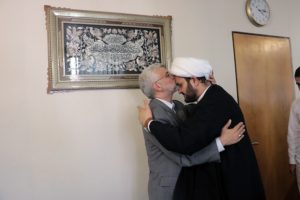
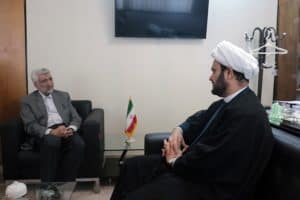
Akram al Kabi greeted by Saeed Jalili, the supreme leader’s representative in the Supreme National Security Council, in Tehran, August 27. Credit: Official Website of Dr. Saeed Jalili.
Parliament Speaker Ali Larijani, a close confidant of Khamenei, also received Kabi on Aug. 27. Larijani vowed to support Nujaba “with everything, because you are good sons of Imam Khomeini in pure Muhammadan Islam.”
“We must know that the enemy’s project in Iraq and Syria continues, and the problem of these two countries will not be resolved with one or two issues,” Larijani continued, acknowledging the long fight ahead.
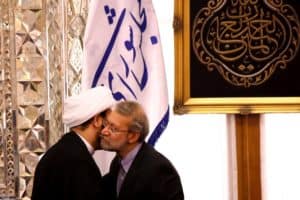
Iran’s parliament speaker meeting with Akram al Kabi on Aug. 27 in Tehran.
On Aug. 28, Kabi met with notorious hardline cleric Ayatollah Ahmad Jannati, chairman of the Assembly of Experts, the body that is tasked with selecting the next supreme leader. Jannati is also close to Khamenei.
“The blood of your martyrs will support you,” Jannati declared, “and we from the supreme leader to the government and nation of Iran will support you.”
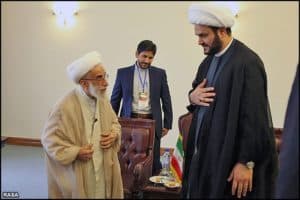
Ayatollah Ahmad Jannati, chairman of the Assembly of Experts, meeting Akram al Kabi on Aug. 28.
Kabi also met with Ali Askari, the head of the Islamic Republic of Iran Broadcasting (IRIB), Iran’s national media, on August 28. Askari stressed the importance of the media and its effects on “the resistance front,” and presented Kabi with a gift from the state outlet.
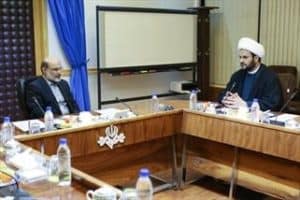
Ali Askar, head of IRIB, meeting with Akram al Kabi on Aug. 28.
Kabi held a press conference at Tasnim News Agency, a media outlet affiliated with the IRGC, on August 28. He thanked the Islamic Republic for all its support and announced that “Imam Khomeini was hundreds of years ahead of his generation.”
Kabi praised Soleimani, proclaiming that “we need Qassem Soleimani’s presence,” who has been involved in “all operations as an advisor.” He reiterated that Soleimani was invited to Iraq per the “formal” invitation of Baghdad. Indeed, the Iraqi government this past summer publicly recognized Soleimani as an official adviser
“They relied on Damascus’ fall within a few months, but it has been a few years that it resists with the help of some countries,” Kabi said. “That the Syrian government has remained is a big victory,” he proclaimed.
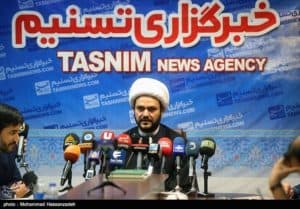
Iraqi militia leader Akram al Kabi at a press conference in Tasnim News Agency.
Kabi also discussed Nujaba’s links to Lebanese Hezbollah. “There have been strong relations with [Lebanese] Hezbollah since the beginning of Iraq’s occupation, and many of our forces have been trained by Hezbollah, and today we receive advising services from them,” Kabi announced. The official spokesman for Nujaba declared in March that “Hezbollah and Harakat al Nujaba are the twins of resistance.”
On Monday, Aug. 29, Kabi met with Alaeddin Boroujerdi, the chairman of the National Security and Foreign Policy Parliamentary Commission. “If the Hashd retreats from Iraq’s western areas, DAESH terrorists will once again return to Iraq. Liberating Raqqa and Deir ez-Zor in Syria are national security issues for Iraq,” Kabi announced.
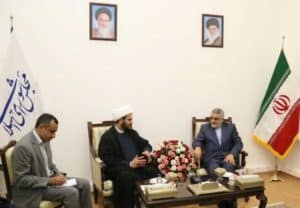
Alaeddin Boroujerdi, chairman of the National Security and Foreign Policy Parliamentary Commission, met with Akram al Kabi on Aug. 29.
Kabi on August 29 also gave an interview to Al-Kowsar, Tehran’s Arabic-language television channel that broadcasts to Arabic-speaking audiences across the globe.
“You DAESH have damaged Islam, but we are the representative of pure Islam,” Kabi declared. “You have been defeated in history, but we have been victorious, and will be victorious again.”
On the evening of Aug. 30, Kabi met with Ayatollah Mohsen Araki, secretary general of the World Forum for the Proximity of Islamic School of Thoughts. The organization was established in 1990 by supreme leader Khamenei to “reconcile” differences between various Islamic sects. The forum has clerical representation and members in several countries.
Kabi predicted that the Islamic State would continue to have an insurgent presence in Iraq following its anticipated defeat in Mosul. Kabi aims to push back against accusations that Nujaba is a sectarian group. Kabi emphasized Nujaba’s open embrace to Sunnis, claiming that the group established a Directorate for Religions and Proximity of Schools [of thought]. According to Kabi, Nujaba supports moderate Sunni clerics and takes them to areas recently captured from the Islamic State to speak with locals. Kabi also claimed that Nujaba has opened Sunni mosques in Shiite areas and protects them.
Kabi held a conference at hardline-affiliated Imam Sadegh University on Aug. 31. Without Tehran’s support, Kabi told the audience, “Damascus and Baghdad would have fallen.” Kabi was optimistic about the end of the war in Syria. “America and Israel are behind the crisis in Syria,” he claimed, “creating this crisis was aimed at damaging the ‘Axis of Resistance,’ so a pro-Israeli government is established in Syria.” Kabi told the audience that the Syrian war “may take a long time” due to “the support of Western and Arab countries” for the anti-Assad opposition.
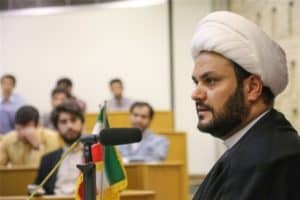
Iraqi militia leader Akram al Kabi at a conference in Imam Sadegh University in Tehran, Aug. 31.
On August 31, the Iraqi militia leader gave a special prime-time interview on state media. The presenter introduced Kabi and Nujaba as having “prominent” roles in major operations and as a “serious” opponent of the presence of the US, accusing it of supporting the Islamic State.
Kabi again thanked the Islamic Republic’s support, calling it “the center of the ’Axis of Resistance’ of the Oppressed in the world.” He said one of the “duties” of “resistance groups” is to travel to Iran “from time to time” to thank and brief the “the officials and nation of Iran” and the “great leader of the revolution who has always supported the resistance” on field developments in Syria and Iraq. He said that the PMF benefits from Iran’s “advisory support.”
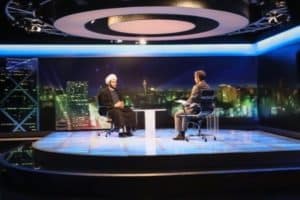
Iraqi militia leader Akram al Kabi in live interview broadcasted on state media Channel 2 on Aug. 31.
“We believe that Hashd forces must formally enter Syria’s soil following the liberation of Mosul and liberate Raqqa and Deir ez-Zor to preserve Iraq’s national security,” Kabi declared.
On Sept. 1, Kabi met with Ali Akbar Velayati, the top foreign policy adviser to the supreme leader. He thanked Iranian officials for “receiving us with open arms.”
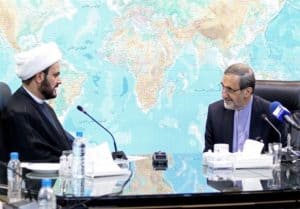
Ali Akbar Velayati, top foreign policy advisor to the supreme leader, meeting with Akram al Kabi in Tehran.
“The main goal of my trip with Iranian officials was to inform them about the latest developments in Iraq and Syria and thanked the great leader of the revolution and the honorable nation of this country,” he said. “The Islamic Republic of Iran is the leader of the world’s oppressed, and this system has stood alongside the Iraqi resistance against the occupiers and DAESH,” proclaimed Kabi.
“Resistance forces have been trained by Iran. It has armed these groups, and Iraqi resistance forces have achieved many victories so far,” claimed Kaabi.
Velayati thanked Kaabi, vowing to continue supporting the territorial integrity of Iraq and accused America of seeking Iraq’s disintegration. He stressed the strategic importance of Iraq and Syria to the Islamic Republic, which form the ‘Axis of Resistance.’ “If Iran, Iraq, and Syria do not cooperate, Lebanon cannot be saved, and this means the chain of resistance,” Velayati said, “and if, God forbid, one of these rings breaks, the whole chain is broken.”
On Sept. 1, Kabi traveled to the holy city of Mashhad and met with an important cleric, Hojjat al Eslam Ebrahim Raisi.
A close confidant of Khamenei, Raisi is the trustee of the Imam Reza Shrine Foundation, which is “not only Iran’s most sacred religious shrine but also by some reckoning the Islamic Republic’s biggest and richest business empire.”
The foundation answers only to the supreme leader and runs its accounts independent from the state, as does the supreme leader’s financial conglomerate. According to Western intelligence reports, this is one of several foundations that provides financial support to Hezbollah in Lebanon. Abdallah Safieddine, Hezbollah’s representative in Iran, told a reporter that his organization receives funding directly from the supreme leader and his conglomerate. Kabi and other IRGC-backed militias in Iraq have access to millions of dollars to finance a wide range of activities, from military operations to social services.
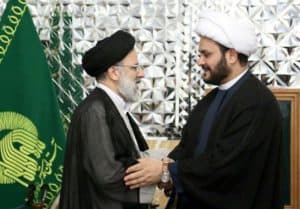
Ebrahim Raisi, an influencial cleric and the trustee of Iran’s wealthiest religious foundation, received Iraqi militia leader Akram al Kabi in Mashhad on Sept. 1.
Kabi boasted about Nujaba’s fight against US forces during the Second Gulf War, claiming its fighters undertook “3,000 operations … and the footage of these operations exist.” He stressed Iran’s support of “resistance groups.”
“The Nujaba Islamic resistance warriors were trained and equipped by Iran, and attained much experienced in the field of combat,” Kabi noted. He also highlighted militia’s use of soft power to gain influence.
“After the exit of American forces from Iraq,” Kabi said, “we started social activities in the country so to confront cultural backwardness in Iraq with intellectual and cultural resistance.”
The wide range of Kabi’s meetings in Iran with wealthy foundation trustees, senior parliamentarians, advisers, diplomats, and commanders reflect the multiple dimensions of Iranian support. One must look beyond the battlefield to understand the Iranian-backed network’s influence in Iraq, especially for the post-Islamic State era. The organizations that the IRGC-backed militias model themselves after, like the IRGC and Lebanese Hezbollah, derive significant portions of their power from non-military activities. The broad range of their activities complement each other.
Kabi’s high-profile visit to Iran underscores his ideological commitment to the Islamic Republic, as well as the Iranian government’s support of its proxies in Iraq. In post-Islamic State Iraq, Kabi and the IRGC-backed network – which are now considered legitimate actors in Iraq – can be expected to contribute to consolidating Tehran’s sphere of influence in Iraq and the Middle East.








2 Comments
This article should be sent to the Yanks. Even kids could decide their foreign policy far more pragmatically than seasoned adults do.
A year ago, Obama hoped that all his concessions to the Iranians, from granting self-inspection of its Fodor nuke weapons fortress to providing the largest state sponsor of terrorism with up to $150+ billion in cash would produce an “unprecedented” (Obama’s favorite word) invitation to Teheran. Instead, the Iranians never ratified the nuclear deal, continued with their nuclear bomb program in spite of the agreement, continue to test long range missiles that will carry nuclear warheads and are harassing our Naval ships in the Straights of Hormuz. And, the Ayatollah never invited Obama to his country, preferring to call the US the Great Satan as often as possible.
While there is still time for Obama to make his pilgrimage to Teheran, the Iranians got all they wanted in the agreement, so they no longer need to pretend to be nice to Hussein Obama.